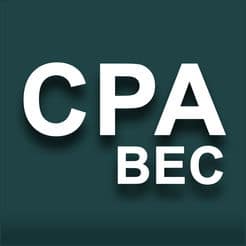
The Business Environment and Concepts (BEC) section of the CPA exam has traditionally been considered the easiest part of the test. Despite that, it’s important not to get complacent when preparing for it.
Far too many people have failed what should have been the easiest part just because they slacked off and didn’t get any work done— don’t be one of those people!
You’ll need strong finance and economics skills in order to score well on this CPA exam section. That’s because the BEC’s core concepts revolve heavily around applying financial skills to generalized business concepts.
The BEC CPA exam is weighted differently from other parts of the test, since it also incorporates a section for written communications.
To be more specific, there are 62 Multiple Choice Questions (MCQs) on the exam that make up 50% of your total grade. Next, you’ll have to complete 4 Task Based Simulations (TSBs) worth 35% of the exam’s grade. Finally, you’ll be required to respond to 3 written communications questions about relevant exam topics. Doing so takes up the last 15% of your grade.
BEC Exam Format
- Exam Time Limit: 4 Hours
- Multiple Choice Test: 62 Questions, 50% of total score
- Task Based Simulations (TSBs): 4 TSBs, 35% of total score
- Written Communication Questions: 3 questions, 15% of total score
- Test Segment #1: 31 Multiple Choice Questions
- Test Segment #2: 31 Multiple Choice Questions
- Test Segment #3: 2 TSBs
- Test Segment #4: 2 TSBs
- Test Segment #5: 3 Written Communication Questions
BEC CPA Exam Topics
- Corporate Governance: 17-27% of the exam
- Economic Concepts and Analysis: 17-27% of the exam
- Financial Management: 11-21% of the exam
- Information Technology: 15-25% of the exam
- Operations Management: 15-25% of the exam
As I stated previously, the test is heavily reliant on financial knowledge related to generalized business concepts. There are several different ways to apply what you’ve learned and the BEC will test you on all of them. Make sure you study each of these areas so you’re prepared for what’s coming. In order to help you out, I’ve looked at the BEC exam blueprint and broken down the areas you need to focus on below.
Required BEC Exam Skills
- Analysis: 20-30%
- Application: 50-60%
- Remembering and Understanding: 15-20%
Corporate Governance
Area 1 of the BEC exam asks you to understand and apply concepts to several topics involving corporate governance. Each one is fairly straightforward, but don’t get complacent in your preparations. Doing so may cause you to miss out on important details as you work.
The specific areas that you need to focus on when studying are as follows:
- Knowledge of how internal control frameworks work and when to use them
- Knowledge of how enterprise risk management frameworks work and when to use them
- Usage of provisions applying to regulatory frameworks and laws for corporate governance
This section focuses almost entirely on the different frameworks used in corporate governance. Because of that, what you need to know here is much less broad than other parts of the test. When studying for the corporate governance section of the BEC exam, make sure you understand the components, purpose, and objectives of each framework. Just focus on those key areas and you’ll have a much easier time with these concepts.
“When studying for the corporate governance section of the BEC exam, make sure you understand the components, purpose, and objectives of each framework. Just focus on those key areas and you’ll have a much easier time with these concepts.”
Economic Concepts and Analysis
Next, you’ll need to understand the topics relating to economic concepts and analysis. Each of these topics relates to risk management or market influences on a company. You should already have a good working knowledge of this from your time in university, but it won’t hurt to study harder in this area.
- An understanding of the economic concepts and analysis that impact the usage of business cycles on a company’s operations in industry and business
- Determining how market influences, such as globalization, effect the environment of a business
- Determining how and why different types of transactions affect accounting and the business reasons for why they do so
- Working knowledge of how to navigate financial risk and minimize the negative impact of doing so
These topics work well as an overview, but the information you need will be more specific. Focus on studying ways to mitigate financial risk and on how variables like interest rate, currency, credit, and more influence a company’s risk. If you can do all of that, this CPA exam section should be a breeze.
“Focus on studying ways to mitigate financial risk and on how variables like interest rate, currency, credit, and more influence a company’s risk. If you can do all of that, this CPA exam section should be a breeze.”
Financial Management
In Area 3 you’ll be asked to explain concepts related to the financial management of an entity. Once again, a background in finance will greatly help you out here. However, if your college education was focused on a different area, you should still be able to learn what you need to know.
Essentially, this part of the BEC CPA exam isn’t especially difficult if you focus on learning each of the following topics:
- Knowledge of factors that can influence a company’s capital structure: risk, profitability, loan covenants, growth rate, leverage, asset structure, and loss of capital
- The ability to calculate metrics involved with each part of working capital: current ratio, turnover ratios, cash conversion cycle, and quick ratios
- Understanding of how business decisions affect and change business capital
- Knowledge of how financial valuation and decision models are used to calculate an asset’s value and compare investment alternatives
As you can see, there’s a small bit of overlap between this section and the last section. This is particularly seen during the discussion of how risks and market influences affect a company. Because of that, you should already know some of this beforehand, which should make studying this section a little easier than the previous one.
Information Technology
The BEC exam won’t be entirely focused on financial information. You’ll also need a working knowledge of how Information Technology (IT) is used to support a business. Anyone with a background in computers will find this section easier than the others.
As with the other sections, the major topics you need to learn are listed below.
- Knowledge of how data gathered from IT and Systems work supports business decisions
- Identifying any IT related risks that come from a company’s information systems and processes. This includes variations in processing integrity and how to protect system availability and information
- Identifying which activities related to general IT control respond well to IT-related risks. This includes controls for access and authorization, different methods of system implementation testing, and plans for responding to incidents.
While this is a good overview of the 4th portion, there are more specific areas you’ll need to brush up on too. Of particular note is how Cybersecurity is used by a company and how it affects their systems. If you can understand that early on then you’ll have an easier time remembering the different concepts involved with IT work.
“The BEC exam won’t be entirely focused on financial information. You’ll also need a working knowledge of how Information Technology (IT) is used to support a business.”
Operations Management
Last but not least, you’ll need to study up on all the topics related to Operations Management. If you studied the other sections then this one will be much easier. That’s because there’s a fair amount of overlap between this and other sections.
As long as you focus on the following topics you can easily understand this area of the test:
- Knowledge of how quality control combined with performance measures improve general business operations
- Applications for variance analysis techniques and concepts based on cost accounting in an entity
- Usage of forecasting techniques and proper budgeting to track progress and improve individual accountability
This section is all about applying the different ideas you’ve learned from the other 4 areas. This includes any techniques related to cost management, budget analysis, and variance analysis. Applying this knowledge will help you both on this test and in your future career.
BEC CPA Exam Timing
When you take the BEC exam you’ll have 4 hours to finish it in its entirety. You’ll be given a 15 minute break after the 3rd exam segment, with the option to take 2 more elsewhere in the exam. However, it’s important to remember that the timer will still run during the optional breaks.
It’s still important for you to practice good time management even though each test section doesn’t have a time limit. When testing, MCQs don’t require as much time as TSBs or written communication problems. That’s why you should try and set aside extra time to complete those two sections of the BEC CPA exam.
Practice ahead of time to speed up your test taking. The more comfortable you are with the material, the faster you’ll be able to naturally answer questions.
Finally, don’t rush so much that the quality of your answers drops. Yes, finishing the exam is important— but so is making sure you don’t miss any of your mistakes.
“When testing, MCQs don’t require as much time as TSBs or written communication problems. That’s why you should try and set aside extra time to complete those two sections of the BEC CPA exam.”
BEC CPA Exam Strategies
Generally, the BEC is known as the easiest part of the CPA exam. That gives you a few options to approach it. You can take it first in order to get it over with quickly, or you can take it last so you end on an easier note. Either way is a valid option, so it’s up to you to decide when you want to take this test.
The most effective way to prepare for the BEC exam is to take practice exams with a review course from Becker or Surgent. Doing so will give you valuable experience with both the content and format. Plus, if you include a similar time limit you can work on your time management and answer speed.
Easily the most important (yet most ignored) strategy is to eat a healthy breakfast before the exam and get a good rest the night before. If you can do that, then you’ll have much more energy throughout the exam. On top of that, you’ll be able to answer questions faster because your mind will be working at 100%.

As stated before, the BEC is the easiest of the 4 tests involved in the CPA exam. Make sure you study the concepts we’ve discussed throughout this article. If you do so, passing the test is all but guaranteed!